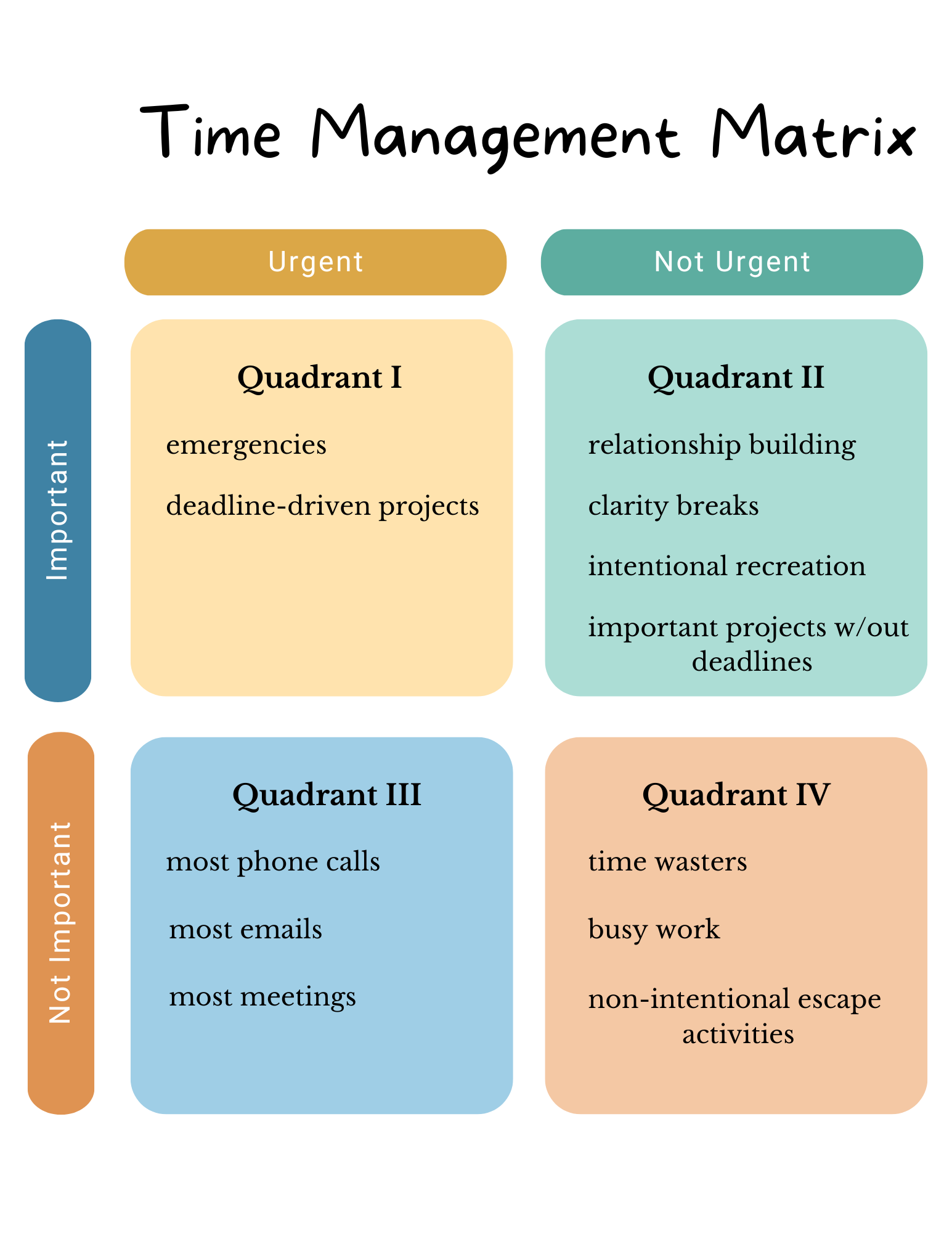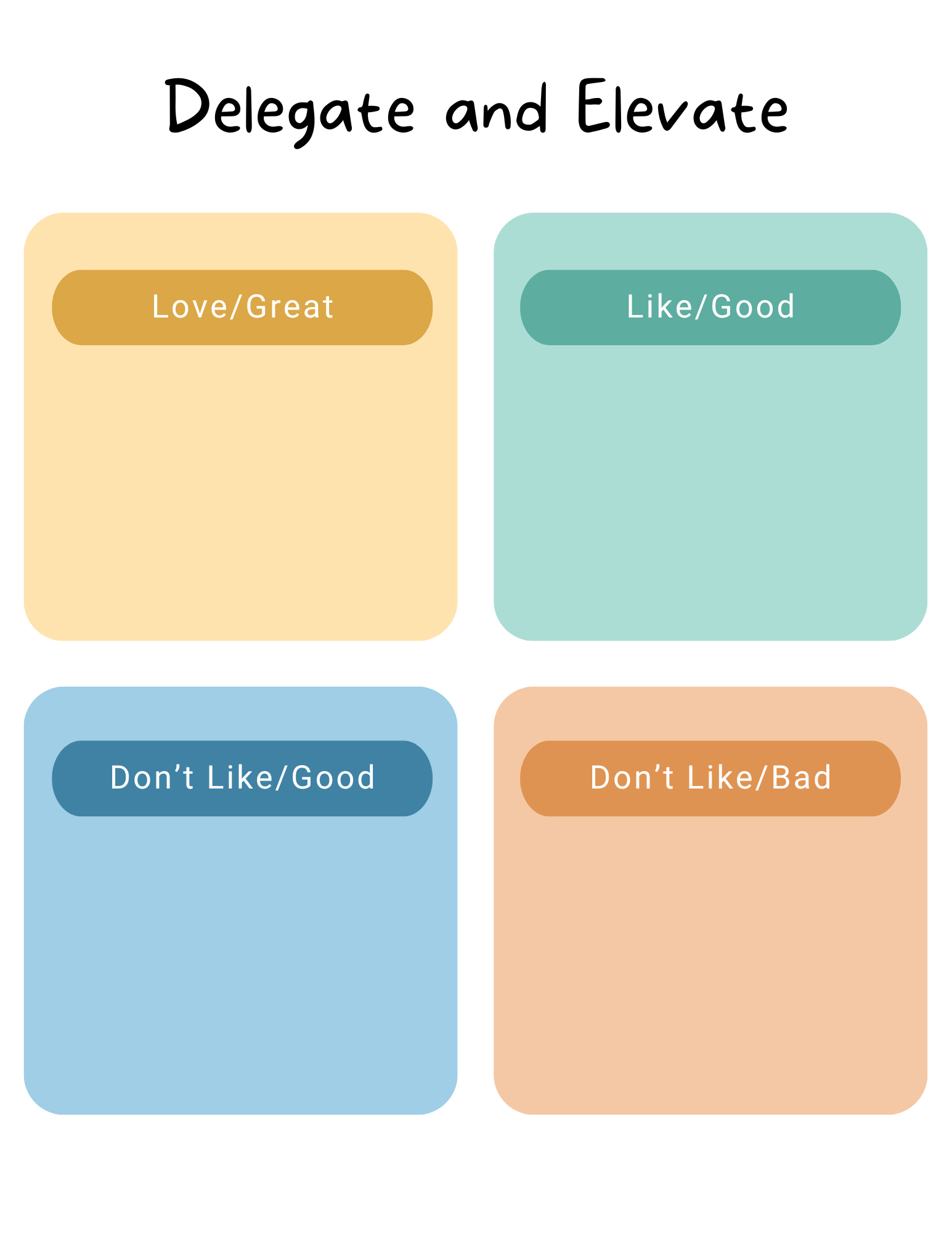Thoughts on Time Management
- nick.leja
- |September 30, 2023
- |Personal Growth
Ever feel like you’re spinning your wheels?
Or that you’re spending most of your time reacting to the world around you instead of paving your own path?
This post on time management should help!

Putting the Ladder on the Right Wall
Before I can effectively manage my time, I need to determine my destination. Otherwise, I’m climbing a ladder without making sure it’s on the right wall.
Even if I’m highly skilled and efficient at climbing, it’s pointless if my ladder is on the wrong wall.
Sometimes, I know where the right wall is. I simply need to reposition my ladder.
Other times, I may feel lost and unsure about my goals and direction. In such cases, I’ve identified two exercises that can be helpful.
Clarity Breaks
When I’m stuck at a crossroads while pursuing my main goal, I find that taking clarity breaks helps me find the right path. Here’s how I do it:
- Write down what I want to figure out.
- Grab a pen and paper.
- Lock my phone in a drawer.
- Find a comfortable place to sit, ideally outside or in a quiet room if outside isn’t practical.
- Set a timer for one hour, preferably not using my phone (since it’s locked away!)
- Just be.
During the “just be” phase, I’m not actively trying to solve the problem, judge my progress, or clear my mind. I’m just being.
The first 20 minutes are usually painful as I feel unproductive and my mind focuses on everything except solving my problem.
The second 20 minutes are a bit more calming as my mind begins to settle.
The final 20 minutes are where the breakthroughs occur. This is when ideas emerge, and solutions to my problem surface, much like noticing the car I’m considering buying everywhere without consciously looking for it.
Mental Maps
If I’m ever really feeling lost or without direction, I’ll make a 5-year personal mind map for myself, typically using Ayoa. In this mind map, I list my 5-year goals: personal, professional, physical, mental, and more.
Numerous studies indicate that writing down our goals significantly increases our chances of achieving them. Mind maps are an excellent starting point for this process.

example of a mental map
Focus on Quadrant II Activities
The Time Management Matrix, created by Stephen Covey in The Seven Habits of Highly Effective People, categorizes activities into four quadrants based on whether they are Urgent/Not Urgent and Important/Not Important.

Quadrant I activities are urgent and important, like emergencies and projects with deadlines.
Quadrant II activities are important but not urgent. These include relationship building, important projects without a deadline, clarity breaks, and intentional recreation / relaxation.
Quadrant III activities are urgent but not important, such as most phone calls, emails, and meetings.
Quadrant IV activities are not important or urgent, such as time wasters, busy work, some calls/emails, or non-intentional escape activities (such as mindlessly checking my phone without a specific purpose).
Quadrant II is where the magic’s at. Every activity here contributes towards achieving my goal. Quadrant I activities are necessary but don’t really move me forward. Quadrant III often traps people, consuming their time, and Quadrant IV is where I find myself when I’m bored or seeking distractions from life.
While climbing a mountain:
- Quadrant I is getting back up after I fall.
- Quadrant II is taking a step forward.
- Quadrant III is looking for a squirrel that just ran past on the trail.
- Quadrant IV is checking my phone with no real purpose or intention.
Willpower
In The One Thing by Gary Keller, the author compares our willpower to a cell phone battery.
First thing in the morning, our mental willpower is at its maximum, like a fully charged battery at 100%. As the day progresses, our willpower gradually depletes. By late evening, it’s nearly drained, making activities like watching TV very tempting after a long day.
Because of this, for good time management, it’s crucial to prioritize our Quadrant II activities at the beginning of the day when our willpower is at its peak.
It’s also important to schedule these activities. When just starting out, I would schedule (and set a timer for) one-hour blocks three times per week.
Now, as much as possible, I block out every day before noon for Quadrant II activities. All my meetings, email-checking, and responding to others’ requests happen after noon.
Delegate and Elevate
Not all activities consume willpower equally. The more we dislike doing something, the more it depletes our willpower. It takes a large amount of willpower to pay all my bills but not so much to play a video game.
To maximize our willpower, the key is to focus on tasks we genuinely enjoy or love, and delegate everything else. A helpful tool for identifying tasks to delegate is the “Delegate and Elevate” tool, which is part of the EOS System created by Gino Wickman.
To use this tool effectively, I categorize my daily activities into four quadrants using the graph below:

As with the Time Management Matrix, most of us get stuck in Quadrant III: things we don’t like doing but are good at.
For tasks we dislike, the best approach is to delegate whenever feasible (acknowledging that the real world may not always align with this ideal). By concentrating on activities we genuinely enjoy, we can achieve significantly more since they require less willpower.
Be At Peace with Losing Balance
Another concept in The One Thing is being at peace with being out of balance. Constantly striving to maintain perfect equilibrium between personal and professional aspects of life can hinder progress.
On any given day, it’s likely that one aspect of life takes precedence over the others. Take vacations, for example. The goal of a vacation isn’t to keep everything perfectly balanced; it’s about dedicating time to fully recharge. During a vacation, it’s okay to prioritize personal life while neglecting professional life temporarily.
Similarly, there are phases when I might be intensely focused on my professional life, and my family or social life may take a back seat. However, when viewed over a more extended period, like a year, my life is balanced. Zooming in on shorter time frames, like a week or month or quarter, it’s okay if some part of my life is temporarily receiving less attention. In fact, this can be necessary to make significant progress in specific areas.
If I try to evenly distribute effort every day to maintain perfect balance, I might end the day without substantial progress. Conversely, if I concentrate on making significant strides in one area each day, I can build positive momentum quickly.
Focusing Question
A final concept from The One Thing relating to time management is the Focusing Question:
“What’s the one thing I can do such by doing it everything else becomes easier or unnecessary?”
If I’m ever stuck with identifying a valid Quadrant II activity, I’ll ask myself that Focusing Question to guide me in the right direction.
An example of this is when I operated several retail stores and kept getting phone calls every night when the credit card settlement didn’t match our POS system. Each night, I had to explain the same steps to different team members, which was both frustrating and time-consuming.
I asked myself the Focusing Question. The answer: create a guide that walks my team through how to handle credit card settlement issues and encourage them to use the guide before calling me. Creating this guide was important, but not urgent, thus making it a Quadrant II activity.
The guide took a while to make, but it instantly freed up a tremendous amount of time once finished.
Conclusion

In short, when it comes to time management:
- Before climbing the ladder, make sure it’s on the right wall.
- Spend as much time in Quadrant II as possible. I should ask myself, “Is what I’m doing important, but not urgent?” If yes, I’m proceed. If not, refocus.
- Schedule my Quadrant II activities early in the day when my willpower is at its peak.
- Delegate things I dislike to maximize my willpower.
- Understand that in the short term, some areas of life may feel out of balance, and that’s okay, even necessary.
- If I’m ever unsure what I should be doing, ask myself the Focusing Question.

